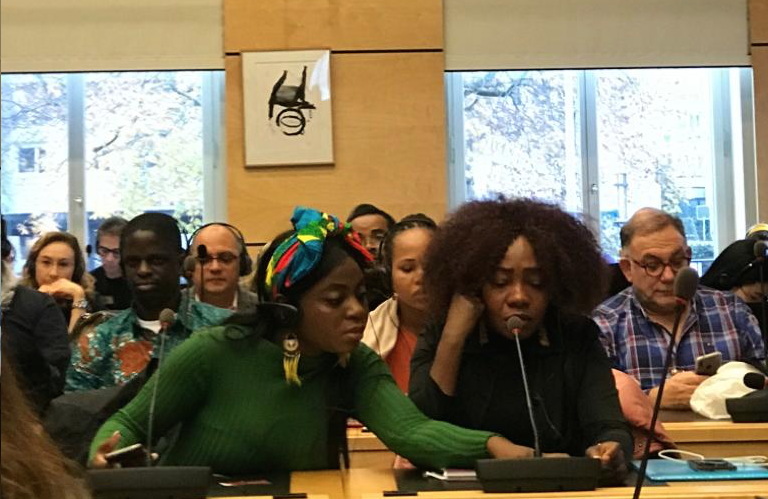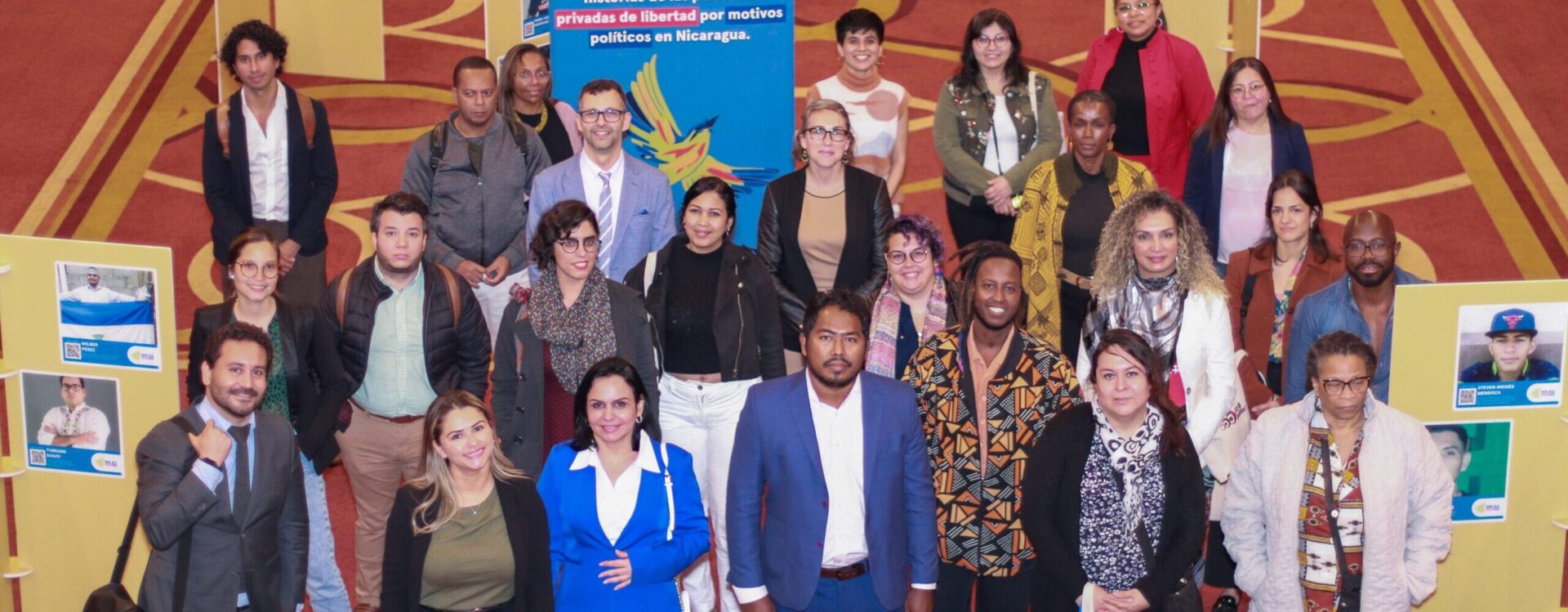Con la participación de organizaciones de la sociedad civil afrocolombiana, Colombia es revisado por el Comité Antirracismo de la ONU
Colombia was reviewed by the UN Committee on the Elimination of Racial Discrimination (CERD) during its 100th session between November 27-28. The Committee conducted a detailed review on the level […]

Colombia was reviewed by the UN Committee on the Elimination of Racial Discrimination (CERD) during its 100th session between November 27-28. The Committee conducted a detailed review on the level of compliance of commitments made by the Colombian government towards the eradication of any form of discrimination and racism in the country by using the State’s responses to the recommendations made to it in its last review in 2015.

“Since its last review of CERD in 2015, the Colombian government has not delivered the necessary response which guarantees the rights of Black, Afro-Colombian, Palenqueras and Raizales (NAPR) communities,” stated an alternative report presented to the Committee by civil society organizations, including the Association of Displaced Afro-Colombians (AFRODES), the National Conference of Afrocolombian Organizations (CNOA), the Chocó Solidarity Inter-Ethnic Forum, the Racial Justice Collective, the National Network of Afro-Colombian Women “Kambiri” and the Consultancy for Human Rights and Forced Displacement (CODHES.)
UN CERD rapporteur member Mayte Verdugo was in charge of carefully reviewing the official report submitted by the Colombian State and of making a series of observations regarding the recognition of the rights of ethnic communities in Colombia.
Rapporteur Verdugo’s observations included: requesting the Colombian State for more information on the results of the last population census of 2018 and questioning the lack of visibility of Afro-Colombian communities in census findings; referring to the situation of Afro-Colombian women victims of the armed conflict; addressing the alarming levels of killed ethnic leaders; questioning the government’s plan to address the processes of prior consultation with ethnic peoples and finally the situation of the implementation of the peace agreement’s ethnic chapter.
DANE’s “Statistical Genocide”
The results of the 2018 National Population and Housing Census in Colombia showed alarming figures about the number of self-recognized NAPR communities, to what different media and civil society organizations have called a “statistical genocide.” The figures published by the Colombian National Department of Statistics (DANE) indicate a decrease in the self-recognized NAPR population since its last count, from 4,311,757 million in the 2005 to 2,982,224 million in 2018. This represents an abnormal decrease of more than 30% of the previous population – nearly 1.3 million self-recognized NAPR individuals.
“These figures do not represent us, and we do not accept them. They are a product of an institutional framework that has ignored the constant alerts made by Afro-descendant and indigenous ethnic organizations,” stated a CNOA press release reacting to the results. Father Emigdio, Secretary General of CNOA, also warned about the impact that these results will have on the lives of NAPR people, which will further obscure the communities and seriously affect the ability of adequate public policies being created that transform the “(structural) conditions of exclusion.”
In this regard, Rapporteur Verdugo and others CERD Commissioners questioned the State’s approach to the principle of self-identification on the 2018 census and pointed out the need to work on best practices that allow the true recognition of the NAPR people. The Colombian State admitted under-registration of the Afro-Colombian population in the results of the 2018 Census, and so it announced that state institutions will continue to work in accordance with the data collected in the 2005 census.
Colombian civil society organizations demanded that the State repeat the census for the Afro-Colombian population, as they warn about the negative effects that the lack of information may bring to ethnic groups in terms of budget allocation, visibility of the reality of the people and the need to create plans and policies for inclusion and equality for them.
“This finding is the responsibility of the Colombian state, which did not guarantee the necessary conditions that would strengthen the self-recognition question in the censuses, despite more than a decade of efforts made by the communities and the State to strengthen the processes of formation of self-identification. It is also worrisome that the National Department of Statistics has chosen to use its own research and data collection methodology, and had not shown confidence in the proposals of the NAPR communities, which included dialogue spaces such as the Inter-Ethnic Census Table that ceased to meet later having concluded the census operation in 2018,” adds Father Emigdio.
Lack of Implementation of the Peace Agreements and Ethnic Chapter
“Despite the existence of legal frameworks as well as advances in recognition of the differential impact of the armed conflict towards the NAPR population, there have not yet been significant changes in structural factors that positively affect ethnic peoples,” warns the alternative report delivered by Colombian civil society.
Similarly, the Ethnic Chapter of the Peace Agreements between the Colombian government and the Revolutionary Forces of Colombia (FARC-EP) designates the ethnic population as “seriously affected by the internal armed conflict” and offers a differential approach to the provisions necessary for the protection and reparation of the populations victims of the conflict. However, the situation of vulnerability, marginalization and violence continues to directly and disproportionately affect ethnic communities, resulting in an alarming number of leaders who have been killed, threatened and displaced from their territories.
Faced with this, the Colombian State admitted that there certainly is a worrying situation caused by illegal drug trafficking groups that threatens the lives of human rights defenders. In this regard, CERD Commissioners asked the Colombian State to take the necessary measures to guarantee the life of community leaders, recalling its obligation to protect the principles of life and the integrity of any person.
In addition, CERD members requested information from the State on the application of Law 70, the processes of prior consultation and land restitution for Afro-descendant and indigenous communities. The Committee pointed out the need to understand the presence of foreign and extractive companies in declared ancestral territories and the multiple denunciations of communities in these territories against the violence produced because of the presence of these foreign groups.
Collective reparation for Afro-Colombian women victims of the conflict
Colombia continues to adopt insufficient collective reparation processes for Afro-descendant women victims of the armed conflict. The case of the Coordination of Afro-Colombian Displaced Women in Resistance (COMADRE) is emblematic in the sense that despite being recognized as subject to collective reparation through Order 092/2008 of the Constitutional Court, the implementation of the reparation plan under the Decree 4635 has not advanced properly. Even worse, the implementation of the plan lacks a gender approach that considers the level of vulnerability of women.
In this matter, Commissioner Chung requested the Colombian State to explain the information contained in the report regarding sexual violence during the armed conflict, more specifically the types of violence, investigations, punishments and apologies of the State. Rapporteur Mayte Verdugo expressed her concern about the high number of cases of sexual violence against Afro-Colombian women and adolescents.
Civil society recommendations to the State of Colombia

During an informal dialogue between members of civil society organizations and CERD representatives, a series of recommendations were made which seek necessary and urgent improvements in the conditions of ethnic populations in Colombia, precisely because of the imminent state of vulnerability of NAPR populations.
Civil society issued recommendations to the Colombian National Department of Statistics to correct the results of the 2018 census regarding the under-registration of the NAPR population in order to mitigate the possible negative impacts against a population that has historically and disproportionately suffered the impacts of under-registration and public policies. In regard to the Peace Accords and the Ethnic Chapter, they urge the full implementation of it and of all legal frameworks that seek to advance the processes of restitution and protection of the rights of Afro-Colombian communities, particularly women. Finally, the Colombian state is urged to implement extraordinary measures to guarantee collective reparation of NAPR women victims of the armed conflict and to advance the established processes with a gender approach.

